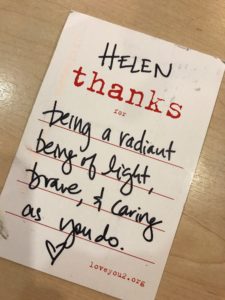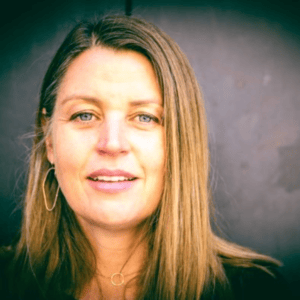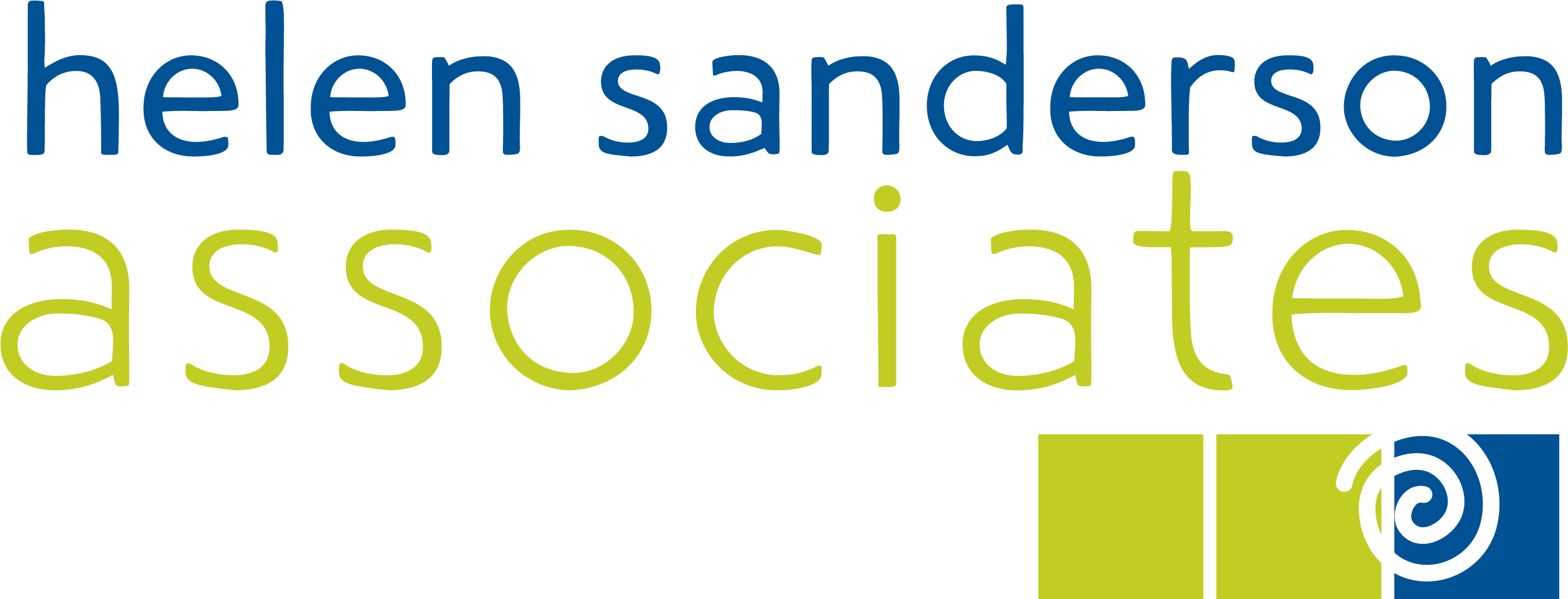Compassion – One love note at a time
By Helen Sanderson


Shannon created Love Notes. I received my first Love Note from my friend and colleague Eric, at a retreat. The Love Note wished me luck with Wellbeing Teams. In August I met the Shannon in person. She is the Love Note Writer, a vibrant innovator creating public displays of affection and a fresh way to think about compassion in life and work. The Love Note that she sent me after that is on my mirror in the bedroom, it means a lot, especially on the days when I do not feel very brave. For me, Love Notes are a practical example of compassion in action, so I asked Shannon to join our blog series about compassion at work. This is her story.
I am Shannon Weber, a social worker by training and a revolutionary at heart.
I grew up the oldest of fourteen children, eight of whom are adopted. My parents are generous, intentional, dedicated, ambitious and compassionate people. Not just within our home, but also as we were taught to treat others – compassion was at the core of my childhood.
These foundational experiences later became the template for my own resiliency plan when I unexpectedly divorced and became a single parent of three young children. Like a compass guiding true north, I returned to my father’s teaching “You give what you have” and my mother’s frequent advice “Imagine what it is like for them.”
I began painting love notes on found scraps of wood and hanging them on chain link fences. It was my offering – a practice of giving what I had. I wrote the messages to my own young children, crafted from deep inside me, but also imagined what it was like for them – the strangers walking by and encountering the signs.
About a year after beginning the love note project, I received a phone call from my sister that my 36 year old brother had been found dead – by suicide.
Nothing in life prepares you for this kind of loss.
I was in a stage of life of muscling through it all — a series of crisis that I had learned to ride like a stoked surfer. I went to work the Monday following his death after sending an email to my supervisors and close colleagues about what happened with an explanation “I don’t think this will effect me much. I do no not plan on taking off work.” I needed my days off work for my kid’s sick days and for the many random days in which school is not in session. Going to work even when I was sick myself or dealing with major issues was a part of the math that barely added up to making it through the school year.
Hazel Georgetti, my kindly and wise supervisor, had welcomed my young son into her office when he was kicked out of grade school and I needed to bring him to work. With that incident, he quickly became her favorite of my children and she championed him at every conversation, any photos that appeared and whenever she saw him. Hazel keep gentle yet close tabs on me in the days following my brother’s death. In the moment that I admitted being in a fog and unable to think clearly she said, “This is when you leave work. This is when you get a plane ticket and go home for the funeral. You come back to us when you are ready.”
After my brother’s funeral when I returned to work, there was a card on my desk. The card signed front back and sideways in much detail by all my co-workers. I realized holding the card in my hands, that Hazel had done what I was unable to do – communicate to my co-workers the devastating heart break of my loss. Co-workers had written such poignant notes that I knew Hazel had shared with them my story, my brother’s story.
Every time I think of my brother’s death, I also think of Hazel. The unexpected compassion of my supervisor that allowed me to process my grief.
Hazel is retired now and I have moved to another program within the organization. When my parents came to town, she drove in from another city to meet them and to talk about their son and his death. She held my mom’s hand while she cried.
This is compassion at work. This is compassion in work.
Creating compassionate workplaces
My primary work is within the hospital care setting – in a San Francisco, California based preconception and prenatal care clinic for women living with and affected by HIV. Compassionate care is at the core of our hospital’s mission and vision. Compassionate care is the clarion call of our clinic’s multidisciplinary team.
As a care team, we began to more deeply examine the impact of trauma on our patient’s lives — the lived experiences of women impacted by HIV include high rates of physical, emotional, sexual and institutional traumas. With a small grant, we developed a one day symposium to expand our knowledge and explore solutions: Beyond Compassion: Caring for Women With a History of Trauma .
In researching, networking and preparing to host the symposium, I had the opportunity to fully realize and acknowledge the traumas of mine and my children’s lived experiences. This was simultaneously liberating and devastating. Knowledge is power. I began to make plans for healing. Healing is a journey.
Preparing for the symposium also sparked an examination of my own role in perpetrating trauma. In what ways to I as a person of privilege, as a leader, as a community member consciously or unconsciously traumatize those around me? Beginning this exploration was also simultaneously liberating and devastating. Knowledge is power. I began a journey to discover what compassionate and conscious leadership might look like.
The preparation to host and then experiencing the symposium had become my compassion journey. I knew this was a journey and not a destination. I knew I had to begin with myself. I knew my lived experiences impacted my mothering, my relationships, my leadership. I committed to a practice of growth and resiliency.
Shortly after the symposium, I drafted some of my key learnings and our team created a Beyond Compassion Manifesto. I feel this manifesto all the way to my bones. It has become my call to action, a prophecy, a guidebook for the way forward.
Shannon has created the “get love. give love.” revolution, changing the world one love note at a time. We are delighted to welcome her to Manchester to work with us at Wellbeing Teams and in communities in July 2018 to bring get ‘get love. give love’ here. If you want to learn more, browse the blog or have a look at submissions from people here.
